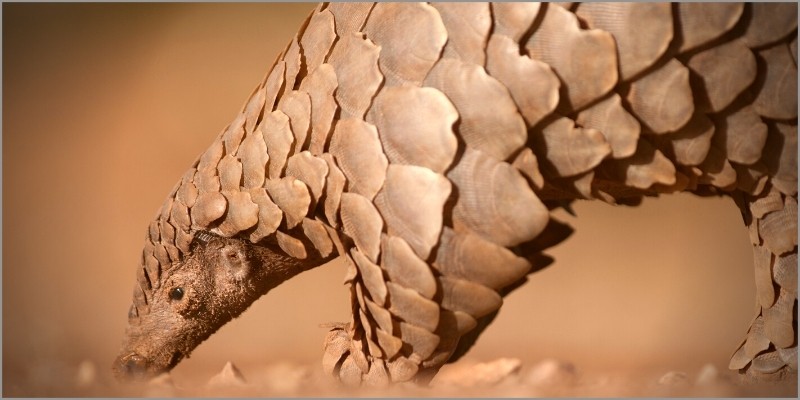Our day with a pangolin
Feb 20, 2021
Many of you already know by now that Gwango will soon expand its operations to include a riverfront destination in Msuna, Zimbabwe.
When we're not with the elephants in Hwange, we spend our time at our favourite spot along the Zambezi river, dreaming of a day, when elephants will again return there. Locals tell of a time, not too far in the past, when there was in fact an abundance of wildlife, but unfortunately, with fewer and fewer protected spaces, an elephant sighting in the area has become rare. Still Msuna, is one of the most spectacular destinations in our country - and a must see for you if you have not yet had the opportunity to visit this beautiful space tucked away beyond the hills of Hwange.
But... today isn't about the elephants. Today is World Pangolin Day, and we're fondly remembering time spent with a pangolin in Msuna. Now - we've had some significant pangolin experiences in our time - from assisting with covert anti-poaching operations to the fireside report of very rare pangolin sightings while on a night drive at Gwango, but the most serendipitous occurence of them all happened in Msuna on November 12, 2019.
It was early one morning, when we were awakened by by a knock on the window of our room. The village Headman had come with news of a pangolin rescued from the fields on the riverbank in Msuna - just a stonethrow away from where we were sleeping. The previous day, we had hosted a community meeting which had become rather focused on streambank cultivation - the local community frequently burns the riverfront vegetation when water levels recede and farms along the riverfront, despite the ecological implications. I'm told it's a cultural tradition!
In Zimbabwe, streambank cultivation is in fact illegal, as the rivers fall under ZimParks jurisdication. I found myself exhausted after making a rather emotional appeal to our new village neighbours, yet I remain hopeful, that the community will some day come together in support of tourism and conservation of the environment, as a sustainable resource.
.. never could I have imagined what would happen next!


The rescued pangolin was found where villagers had been burning and clearing. It's home was right in front the place where our meeting had been held the previous day.
Msuna is a small community, so already we knew the Headman and many of the other villagers, and it wasn't long before people were stopping by to whisper in my ear about just how symbolic this was. The pangolin was a sign they said - and suddenly, what had seemed like a very difficult day of trying to pursuade deaf ears now ignited hope within me. Others seemed to suspect that perhaps there were untold activities taking place in the fields along the river. Surely now, the villagers would understand the importance of this habitat and could see a future for tourism, job creation, sustainable livelihoods.. surely this would make right vs wrong more obvious!
Danny and I dressed hurriedly and walked down with the Headman to the ZimParks ranger station, in hopes of getting a glimpse of the poor creature. When we got there, a nervous looking ranger, opened the door to a makeshift metal shed.
We spotted the tightly wound ball of scales in the far corner of the shed and I could see the fear on the ranger's face. He'd been given the tall task of safekeeping something incredibly rare and endangered. We quickly asked him what was the plan - the pangolin had been removed from it's home and couldn't be left in the hot metal shed for too long. He suggested we phone his higher ups, who upon hearing that we were in the area suggested that we find a comfortable space and safekeep the pangolin while ZimParks arranged for it to be transported to Hwange National Park.
Msuna being over an hour's drive from Hwange National Park, we decided to move the pangolin to a grassy patch close to where it had been rescued. We all would have loved to see it scamper back home, but some villagers now were temporarily staying in its habitat - and there was no choice but to go along with the plan.
For the remainder of the day, we kept our eyes on the beauiful pangolin. We couldn't dare take your eyes off it. After we had carried it to the outdoor space, it seemed to relax as it slowly unfurled to reveal its long body of keratinous scales and tiny face. It gazed at us with gentle eyes before walking cautiously (yet quickly) towards the cover of shrubs, where it seemed to fall asleep almost instantly. One can only imagine the night it must have had.


I could write a novel about what it felt like to serve as guardian to a pangolin for a day, but I'll close by saying, it was translocated to Hwange National Park a few hours later when Amos Gwena (ZimParks representative) came to retrieve it from our watchful care. Pangolins being on the verge of extinction means that spotting one in the wild is not only rare, but practically impossible. We got to spend almost an entire day with this national treasure, and it left us in awe of these reclusive and heavily trafficked mammals.
Naturally, I was very sad to see this pangolin lose its home. We have since looked for ways to safeguard them and we remain thankful to ZimParks for entrusting us to look after this very special and vulnerable pangolin while logistics were being worked out.
~ Elisabeth